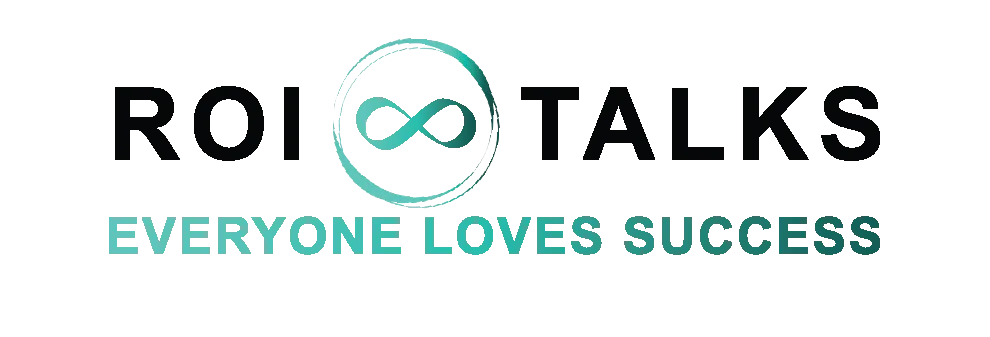Everyone Loves Success
ROI TALKS
Roi Talks Blog

Stop Saying: "The mind is everything. You become what you think about"
Imagine a world where your every thought, feeling, and emotion shapes your reality—a world where the power of the mind transcends its physical boundaries and encompasses the entirety of your being. Is this simply a figment of our imagination, or could there be a deeper truth to this notion?
"The mind is everything. You become what you think about" echoes through the ages as if whispered by some ancient sage. It is often attributed to individuals such as Buddha, Earl Nightingale, Ralph Waldo Emerson and many more. But its origins are unclear. This has become a popular mantra, often used to promote the power of positive thinking. The extremely pathetic part is that it is often thrown around as a catch-all solution when life gets tough, rough and painful.
This oversimplification of a complex phenomenon can lead to misunderstandings and misinterpretations. While this quote/ phrase suggests that our thoughts are the only determining factor of our reality, the truth goes much deeper. This profound statement is not only misunderstood but also a hidden doorway into the depths of your mind.
What is the Mind?
The mind is an intricate system of cognitive faculties that includes perception, thinking, judgment, language, and memory. It is responsible for processing information, interpreting experiences, and creating our subjective reality. The mind is often considered to be synonymous with the brain; however, the mind transcends the physical limitations of the brain and encompasses the entirety of our conscious and subconscious experiences.
What are Thoughts?
Thoughts are mental constructs that represent ideas, concepts, or images. They can be fleeting or persistent and are the products of our mind's processing of sensory input and past experiences. Thoughts form the basis for our beliefs, attitudes, and intentions, and they play a crucial role in shaping our perception of the world.
What is Thinking?
Thinking is the process of generating, organizing, and manipulating thoughts to solve problems, make decisions, and create new ideas. It can be conscious, such as when we deliberately ponder a question, or unconscious, as when we daydream or experience sudden insights. Thinking is a dynamic process that allows us to engage with our environment, learn from our experiences, and adapt to new situations.
What are Feelings?
Feelings are the subjective emotional responses we experience in reaction to internal or external stimuli. They arise from the interplay of our thoughts, beliefs, and physical sensations and serve as a way for our minds to communicate and process our experiences. Feelings can be complex and varied, ranging from joy and love to anger and sadness.
Interconnection between Mind, Thoughts, Thinking & Feelings
The mind, thoughts, thinking, and feeling are intricately interconnected, forming a complex web of feedback loops and interactions. Thoughts influence feelings, which in turn affect thinking processes and the mind's overall state. This interplay shapes our perception of reality, our behaviour, and our relationships with others.
Research in psychology and neuroscience has shown that our subconscious mind plays a critical role in shaping our thoughts, behaviours, and emotions. The subconscious mind is responsible for storing and processing vast amounts of information, including memories, beliefs, attitudes, and habits.
Tor Nørretranders' book "The User Illusion: Cutting Consciousness Down to Size" delves into numerous fascinating findings and concepts related to the mind and consciousness from a neurological perspective. Here are some specific data and facts from the book:
The Bandwidth of Consciousness: Nørretranders introduces the concept of the bandwidth of consciousness, which he estimates to be around 16 bits per second. In contrast, the bandwidth of our sensory input is much higher, estimated at 11 million bits per second. This discrepancy highlights how much of our sensory experience remains unconscious or filtered out.
The User Illusion: The "user illusion" refers to the idea that our conscious experience is a simplified representation of the vast amount of information processed by our brains. It is akin to the user interface on a computer, which simplifies complex processes for ease of use. Our conscious experience, like a user interface, provides us with a coherent and useful, but limited, understanding of our internal and external worlds.
The Half-Second Delay: Nørretranders discusses the phenomenon of the half-second delay in consciousness. Research has shown that it takes approximately half a second for sensory input to be processed and incorporated into our conscious experience. This delay underscores the idea that our perception of the present moment is always slightly behind the actual events.
The Role of Unconscious Processing: The book emphasizes the significant role that unconscious processes play in our mental lives. Nørretranders argues that our unconscious mind is responsible for processing the vast majority of sensory input and making decisions before we become consciously aware of them. This supports the notion that much of our behaviour and decision-making is driven by unconscious processes.
The Iceberg Model of Consciousness: Nørretranders uses the iceberg analogy to describe the relationship between conscious and unconscious processes. In this model, our conscious mind is like the tip of an iceberg, representing a small fraction of our mental activity. Meanwhile, the submerged portion of the iceberg represents the extensive unconscious processing that occurs beneath the surface of our awareness.
Many of our mental contents are formed during our childhood and can be deeply ingrained in our psyche and then there are the memories, experiences, behaviours, attitudes, and habits of our ancestors embedded in our DNA. They can affect our perception of the world, our self-image, and our interactions with others.
For instance, if a person grew up in an abusive environment, they may have developed a belief that they are unworthy or unlovable. This belief can shape their thoughts and behaviours, leading them to avoid close relationships or engage in self-destructive behaviours.
Similarly, if a person has been exposed to negative media messages about certain groups of people, they may develop biases and prejudices without even realizing it. These biases can influence their thoughts and actions, leading them to discriminate against others.
Our thoughts and emotions can influence our physical health. For example, chronic stress can lead to a host of health problems, including high blood pressure, heart disease, and diabetes. On the other hand, positive emotions like joy, gratitude, and contentment can boost our immune system and improve our overall well-being.
Embracing Your Mind
Our minds are incredibly complex and powerful, shaping our perceptions, emotions, and actions. Embracing our minds means accepting and nurturing every aspect of our mental processes, both conscious and unconscious. By doing so, we can develop self-awareness, foster personal growth, and lead more fulfilling lives. Some of the greatest work done on embracing your mind:
Thich Nhat Hanh - The renowned Buddhist monk and mindfulness teacher emphasizes the importance of mindfulness and present-moment awareness in transforming our thoughts, thinking, and emotions. By practising mindfulness, we can cultivate an inner stillness that allows us to observe and disengage from negative thought patterns and emotions.
Dr Gabor Mate - A prominent physician and addiction expert, Dr. Mate has extensively researched the impact of childhood trauma on our thoughts, emotions, and overall well-being. By addressing and healing trauma, we can free ourselves from the unconscious patterns that perpetuate suffering and create a healthier relationship with our minds, thoughts, and feelings.
Mieko Kamiya - The Japanese psychiatrist and author has explored the concept of "ikigai," or the reason for being, as a key component of emotional well-being. By connecting with our ikigai and aligning our thoughts, thinking, and feelings with our purpose, we can experience greater fulfilment, happiness, and emotional balance.
Dr David R. Hawkins - The renowned psychiatrist and consciousness researcher developed a model called the "Map of Consciousness," which categorizes different levels of human consciousness based on their vibrational frequencies. By raising our level of consciousness, we can shift our thoughts, thinking, and feelings towards more positive, empowering states and foster personal growth.
Dr Ihaleakala Hew Len - A leading practitioner of the Hawaiian healing method called Ho'oponopono, Dr Hew Len emphasizes the importance of taking responsibility for our thoughts, emotions, and experiences. By practising self-responsibility and forgiveness, we can cleanse our subconscious mind, foster emotional balance, and create a more harmonious relationship with our thoughts, thinking, and feelings.
A Framework for Understanding Your Mind
Drawing on the insights from these experts, here is a possible framework for understanding the mind and its interconnected elements:
Mindfulness: Cultivating awareness of our thoughts and feelings, as taught by Thich Nhat Hanh. Mindfulness is the practice of being fully present and aware of our thoughts, feelings, and bodily sensations without judgment. Incorporating mindfulness into your daily life can help you become more in tune with your inner world and develop greater self-awareness.
Emotional Healing: Addressing unresolved traumas and their impact on our well-being, as explored by Dr Gabor Mate. Embracing your mind means accepting your thoughts and emotions without judgment. Cultivate self-compassion by acknowledging your feelings, treating yourself with kindness, and understanding that everyone experiences difficult emotions. Remember that negative thoughts and emotions are a natural part of being human, and it's essential to treat yourself with kindness during those times.
Ikigai: Discovering your purpose and passions, as described by Mieko Kamiya. Identify activities or subjects that genuinely excite you and make you feel alive. These passions can be hobbies, interests, or fields of study that you enjoy and find meaningful. Look for the intersection of your passions, strengths and values. It may not be a specific job or activity but rather a general direction or theme that you can pursue in various ways.
Consciousness: Recognizing the role of our awareness in shaping our reality, as examined by David R. Hawkins. Embracing your mind also means exploring the vast, often hidden world of your unconscious thoughts, beliefs, and desires. By uncovering the deeper aspects of your psyche, you can gain insights into your motivations and beliefs, which can lead to personal transformation.
Ho'oponopono: Practicing self-forgiveness and personal growth through a traditional Hawaiian healing process, as taught by Dr Ihaleakala Hew Len. By embracing your mind and developing emotional wisdom, you can improve your relationships, decision-making, and overall well-being. Practice empathy, active listening, and assertive communication to develop emotional wisdom.
Using the Framework for Understanding the Mind: A Step-by-Step Guide
This framework for understanding the mind incorporates insights from various experts, helping you develop self-awareness, heal emotional wounds, and discover your life's purpose. Here's how to use this framework effectively:
Develop Mindfulness:
Practice meditation daily, starting with just a few minutes and gradually increasing the duration. Focus on your breath or a chosen object, and gently bring your attention back whenever your mind wanders.
Incorporate mindfulness into daily activities, such as eating, walking, or doing household chores. Pay attention to your senses, and try to fully experience the present moment.
Use grounding techniques, like deep breathing or progressive muscle relaxation, to manage stress and increase mindfulness.
Address Emotional Healing:
Reflect on past traumas, emotional wounds, and unresolved issues. Be honest with yourself about their impact on your well-being.
Seek professional help, such as therapy or counselling, to work through these experiences and develop coping strategies.
Practice self-compassion by acknowledging your emotions, forgiving yourself, and understanding that healing is a process.
Discover Your Ikigai:
Reflect on your passions, values, and unique skills. Consider what activities bring you joy, what gives you flow, and how you can contribute to the world.
Write down your insights, and look for common themes that can help you identify your ikigai, or life purpose.
Take steps to align your life with your purpose, whether it's pursuing a new career, volunteering, or engaging in wholesome hobbies that bring you joy.
Explore Consciousness
Study the works of David R. Hawkins and other consciousness researchers to understand the different levels of awareness and their impact on your thoughts, emotions, and reality.
Engage in self-reflection and introspection regularly, evaluating your thoughts, beliefs, and actions.
Participate in personal growth workshops, retreats, or seminars to deepen your understanding of consciousness and how it shapes your life.
Practice Ho'oponopono:
Learn about the traditional Hawaiian healing process of Ho'oponopono, which focuses on self-forgiveness and personal growth.
Repeat the Ho'oponopono tool "Thank you, I love you" to release, clean, heal and transmute negative or unwholesome emotions and beliefs.
Incorporate Ho'oponopono into your daily life by using the mantra in moments of stress, conflict, or when you need to forgive yourself or others.
By following this step-by-step guide, you can effectively use the framework for understanding the mind to improve your self-awareness, emotional well-being, and overall life satisfaction. Remember that personal growth is an ongoing process, and be patient with yourself as you work through each step of the framework.
It's crucial to refrain from generalizing and saying, "The mind is everything. You become what you think about." This statement is highly misunderstood, and people tend to throw it back at you when things are not great. We must acknowledge that our thoughts, feelings, and experiences are far more complex and interconnected than this simplified notion implies.
As we embark on this path of self-discovery, it's essential to recognize that growth is a lifelong process, and we must continually nurture our minds and hearts with patience and compassion. The profound impact of this journey not only touches our own lives but ripples outward, inspiring and uplifting those around us. When we understand and embrace the incredible power of our minds, we can create lasting change in our lives, our relationships, and the world at large.
So, let this be an invitation to embark on this remarkable journey. Take a leap of faith, and dive into the endless possibilities that lie within the vast and mysterious landscape of your mind. In doing so, you'll find that the key to unlocking your true potential, achieving inner peace, and living a life of purpose and passion is already within you, waiting to be discovered. Let this be the start of a new chapter in your life, one filled with growth, transformation, and a deeper connection to your truest self.
ROI TALKS™
Marina Plaza - Office 1004 -1006
Dubai Marina, Dubai, UAE





